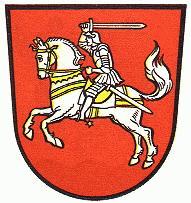Süderdithmarschen: Difference between revisions
Knorrepoes (talk | contribs) (Created page with '{|width="100%" style="color:black; background-color:#ffffcc;" |width="15%"|50 px|left |width="70%" align="center" |'''Heraldry of the World<br/>Civic heraldr…') |
Knorrepoes (talk | contribs) No edit summary |
||
| Line 15: | Line 15: | ||
The arms were granted in 1963. | The arms were granted in 1963. | ||
Ditmarschen was a free republic from the 13th until the 16<sup>th</sup> century. After the conquest in 1559 by Adolf of Gottorf, Duke of Holstein, his brother Johann of Haldersleben and his nephew King Fredrich II of Denmark, Ditmarschen was split in Norder- and Süderditmarschen. Both new territories had until 1867 rather much political freedom. | Ditmarschen was a free republic from the 13th until the 16<sup>th</sup> century. After the conquest in 1559 by Adolf of Gottorf, Duke of Holstein, his brother Johann of Haldersleben and his nephew King Fredrich II of Denmark, Ditmarschen was split in Norder- and Süderditmarschen. Both new territories had until 1867 rather much political freedom. | ||
The oldest seals of Ditmarschen showed the St. Mary and St. Oswald, the two patron saints of the republic. The seal of Ditmarschen on the Act of Capitulation in 1559 shows the St. Mary as Mother Dolorosa, probably indicating the loss of freedom. After the capitulation no single seal has been used for Ditmarschen. Norderditmarschen used in the late 16<sup>th</sup> century a seal with the St. Mary in a cross with solar rays. | The oldest seals of Ditmarschen showed the St. Mary and St. Oswald, the two patron saints of the republic. The seal of Ditmarschen on the Act of Capitulation in 1559 shows the St. Mary as Mother Dolorosa, probably indicating the loss of freedom. After the capitulation no single seal has been used for Ditmarschen. Norderditmarschen used in the late 16<sup>th</sup> century a seal with the St. Mary in a cross with solar rays. | ||
The knight in the present arm appears rapidly after 1559 in the arms of the Dukes of Holstein for the new territory. It was not popular in Ditmarschen, as it showed a knight of Holstein. However, in the 18<sup>th</sup> century the governors of both Ditmarschens started to use the knight as a symbol. Finally in the 19<sup>th</sup> century it was adapted as the symbol of Ditmarschen by the population. Both the counties started to use the knight in their seals in the 1930s. | The knight in the present arm appears rapidly after 1559 in the arms of the Dukes of Holstein for the new territory. It was not popular in Ditmarschen, as it showed a knight of Holstein. However, in the 18<sup>th</sup> century the governors of both Ditmarschens started to use the knight as a symbol. Finally in the 19<sup>th</sup> century it was adapted as the symbol of Ditmarschen by the population. Both the counties started to use the knight in their seals in the 1930s. | ||
Revision as of 07:44, 9 February 2011
| Heraldry of the World Civic heraldry of Germany - Deutsche Wappen (Gemeindewappen/Kreiswappen) |
SÜDERDITMARSCHEN (MED)
State : Schleswig-Holstein
Incorporated into : 1970 Ditmarschen
Origin/meaning :
The arms were granted in 1963.
Ditmarschen was a free republic from the 13th until the 16th century. After the conquest in 1559 by Adolf of Gottorf, Duke of Holstein, his brother Johann of Haldersleben and his nephew King Fredrich II of Denmark, Ditmarschen was split in Norder- and Süderditmarschen. Both new territories had until 1867 rather much political freedom.
The oldest seals of Ditmarschen showed the St. Mary and St. Oswald, the two patron saints of the republic. The seal of Ditmarschen on the Act of Capitulation in 1559 shows the St. Mary as Mother Dolorosa, probably indicating the loss of freedom. After the capitulation no single seal has been used for Ditmarschen. Norderditmarschen used in the late 16th century a seal with the St. Mary in a cross with solar rays.
The knight in the present arm appears rapidly after 1559 in the arms of the Dukes of Holstein for the new territory. It was not popular in Ditmarschen, as it showed a knight of Holstein. However, in the 18th century the governors of both Ditmarschens started to use the knight as a symbol. Finally in the 19th century it was adapted as the symbol of Ditmarschen by the population. Both the counties started to use the knight in their seals in the 1930s.
Literature : Stadler, K. : Deutsche Wappen - Bundesrepublik Deutschland. Angelsachsen Verlag, 1964-1971, 8 volumes; Reissmann, M. : Die Wappen der Kreise, Ämter, Städte und Gemeinden in Schleswig-Holstein. Landesarchiv Schleswig-Holstein, Husum, 1997.

